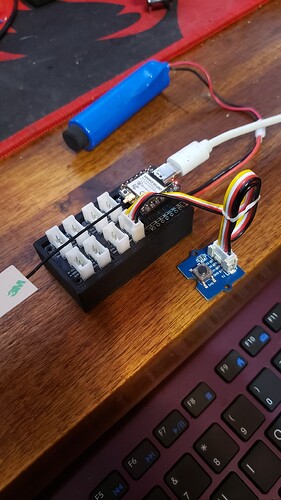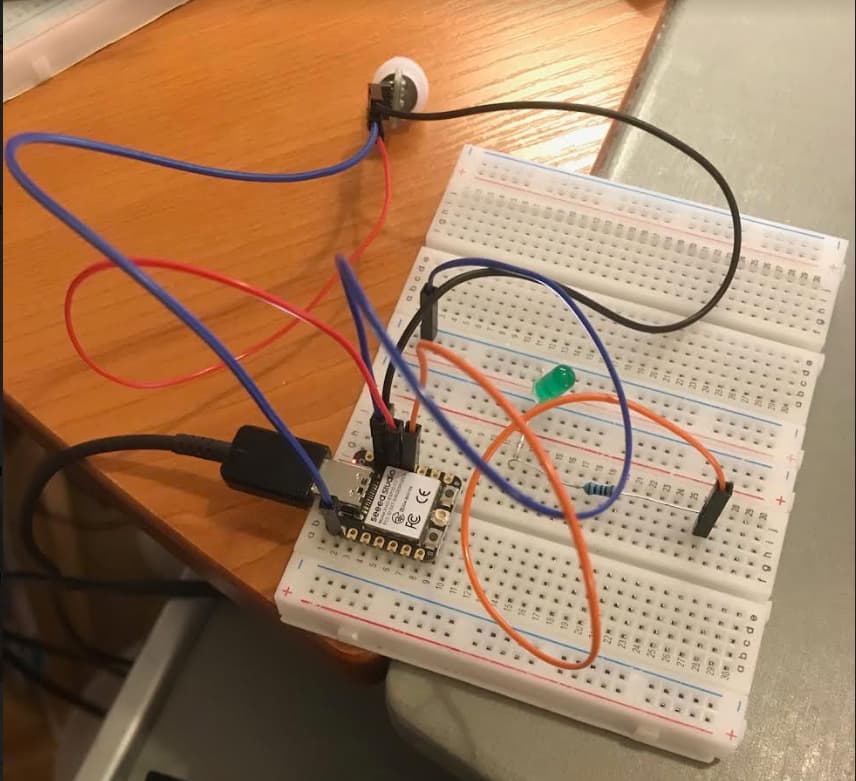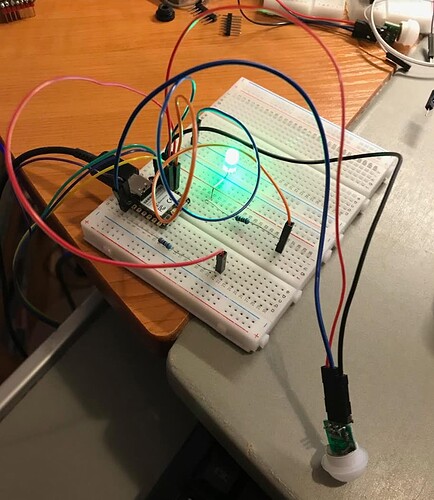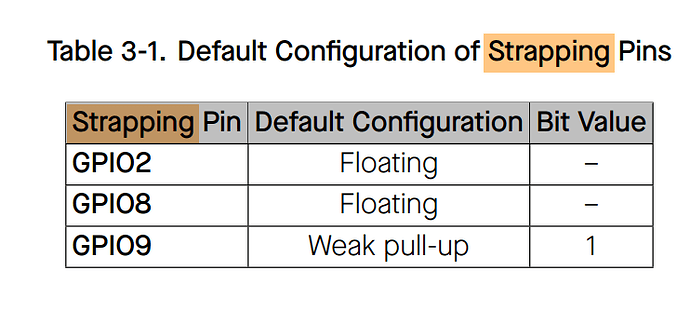The RTC module is pretty standard: DS3231 AT24C32 Real Time Clock Module.
I am not sure if there is a pullup resistor on it already.
The boot resets I got also seems to be related to my failed attempt at getting this to work, as I get the same issue when I change to D1 as rtc pin.
The RTC module has worked as expected with alarms not involving deep sleep.
TBH, your keypad example is a bit too complex for me to decipher the parts I could use. I can share my failed attempt and maybe you can give me some hints based on that?
#include <RTClib.h>
// Define the DS3231 Interrupt pin (will wake-up the ESP32 - must be an RTC GPIO)
#define CLOCK_INTERRUPT_PIN GPIO_NUM_2 // Only RTC IO are allowed
#define BUTTON_PIN_BITMASK(GPIO) (1ULL << GPIO) // 2 ^ GPIO_NUMBER in hexvoid setup()
// LED for visual indication
const int ledPin = 10;
// Save how many times the ESP32 woke-up
RTC_DATA_ATTR int bootCount = 0;
// Instance for the RTC
RTC_DS3231 rtc;
// Set the alarm
//DateTime alarm1Time = DateTime(2025, 05, 23, 13, 55, 0);
// Method to print the reason by which ESP32 has been awaken from sleep
void print_wakeup_reason() {
esp_sleep_wakeup_cause_t wakeup_reason;
wakeup_reason = esp_sleep_get_wakeup_cause();
switch (wakeup_reason) {
case ESP_SLEEP_WAKEUP_EXT0: Serial.println("Wakeup caused by external signal using RTC_IO"); break;
case ESP_SLEEP_WAKEUP_EXT1: Serial.println("Wakeup caused by external signal using RTC_CNTL"); break;
case ESP_SLEEP_WAKEUP_TIMER: Serial.println("Wakeup caused by timer"); break;
case ESP_SLEEP_WAKEUP_TOUCHPAD: Serial.println("Wakeup caused by touchpad"); break;
case ESP_SLEEP_WAKEUP_ULP: Serial.println("Wakeup caused by ULP program"); break;
default: Serial.printf("Wakeup was not caused by deep sleep: %d\n", wakeup_reason); break;
}
}
void IRAM_ATTR onAlarm(){
Serial.print("Alarm occurred!");
}
void setup() {
Serial.begin(115200);
//pinMode(CLOCK_INTERRUPT_PIN, INPUT);
//Print the wakeup reason for ESP32
print_wakeup_reason();
delay(2000);
Serial.println("wakey wakey");
//Blink the LED when the ESP32 wakes-up
digitalWrite(ledPin, HIGH);
delay(1000);
digitalWrite(ledPin, LOW);
// Initialize the RTC
if(!rtc.begin()) {
Serial.println("Couldn't find RTC!");
Serial.flush();
while (1) delay(10);
}
// We don't need the 32K Pin, so disable it
rtc.disable32K();
// The alarm will trigger an interrupt
pinMode(CLOCK_INTERRUPT_PIN, INPUT_PULLUP);
attachInterrupt(digitalPinToInterrupt(CLOCK_INTERRUPT_PIN), onAlarm, FALLING);
// Set alarm 1, 2 flag to false (so alarm 1, 2 didn't happen so far)
// if not done, this easily leads to problems, as both register aren't reset on reboot/recompile
rtc.clearAlarm(1);
rtc.clearAlarm(2);
// Stop oscillating signals at SQW Pin otherwise setAlarm1 will fail
rtc.writeSqwPinMode(DS3231_OFF);
// Turn off alarm 2 (in case it isn't off already)
// again, this isn't done at reboot, so a previously set alarm could easily go overlooked
rtc.disableAlarm(2);
//Serial.println(rtc.now());
// Schedule an alarm
if(!rtc.setAlarm1(rtc.now() + TimeSpan(0, 0, 2, 0), DS3231_A1_Minute));
// Increment boot number and print it every reboot
++bootCount;
Serial.println("Boot number: " + String(bootCount));
// Configure external wake-up
//esp_sleep_enable_ext0_wakeup(CLOCK_INTERRUPT_PIN, 0); //1 = High, 0 = Low
esp_deep_sleep_enable_gpio_wakeup(BUTTON_PIN_BITMASK(CLOCK_INTERRUPT_PIN),ESP_GPIO_WAKEUP_GPIO_HIGH);
Serial.println("Going to sleep now");
esp_deep_sleep_start();
}
void loop() {
// The code never reaches the loop, because the ESP32 goes to sleep at the end of setup
//Serial.print("This will never be printed!");
}
This last version doesn´t crash, but just constantly wakes up:
11:14:12.358 → wakey wakey
11:14:13.381 → Boot number: 2
11:14:13.381 → Going to sleep now
11:14:15.426 → Wakeup was not caused by deep sleep: 7
11:14:15.426 → wakey wakey
11:14:16.712 → Boot number: 3



